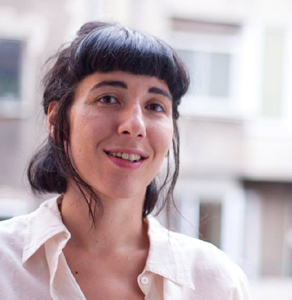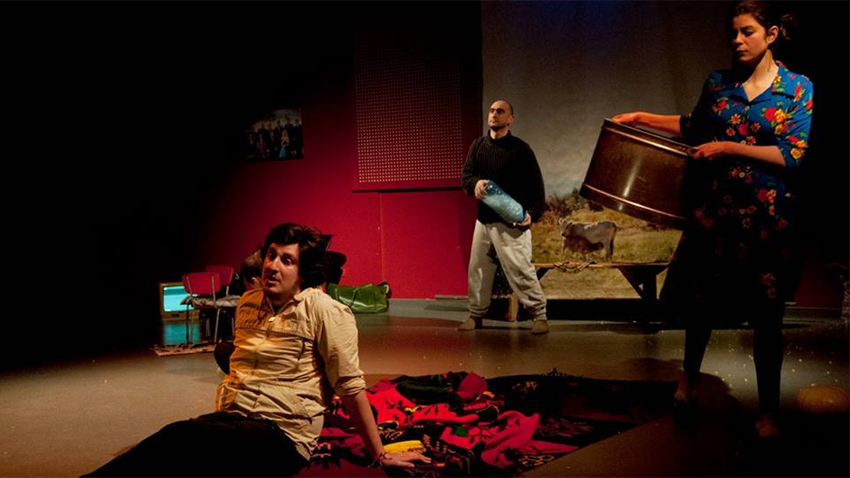Do we need theatre and does it keep abreast with the time we now live in? Those questions always come to my mind when I start looking at the posters. I quickly found the answer to the questions, because some of the topics in today’s theatre plays have been topical for centuries. Radio Bulgaria presents young Bulgarian actress and director Neda Sokolovska who has been developing a little popular theatre genre-documentary theater. Here is what made her venture into the unknown.
 “It is very difficult to remember the turning moment, when I decided to deal with documentary theater. I think it happened back in 2009 when I went to study in Finland. In fact, my stay in that country influenced my choice a lot. The alternative theatre genres were highly developed in that country and education itself encouraged us to look for our own way and language in art. Then, I realized that I was more interested in what happened around us. The situations we found ourselves in seemed to me much more important, deeper and paradoxical than those created at the stage.”
“It is very difficult to remember the turning moment, when I decided to deal with documentary theater. I think it happened back in 2009 when I went to study in Finland. In fact, my stay in that country influenced my choice a lot. The alternative theatre genres were highly developed in that country and education itself encouraged us to look for our own way and language in art. Then, I realized that I was more interested in what happened around us. The situations we found ourselves in seemed to me much more important, deeper and paradoxical than those created at the stage.”
Neda Sokolovska’s purpose is to turn the words used in her theater plays into live speech, i.e. they must be outspoken by other people and must not be invented. On the other, hand, stage performance must be natural, without any affectations. The topics in Neda Sokolovska’s plays are directed to different social groups, described by Neda herself as invisible. The people with disabilities, the non-traditional sexual orientation and the homeless and socially-disadvantaged people seem to be in the periphery of the Bulgarian society. The state authorities are even not trying to solve their problems, as if they do not exist at all. Attitude towards those people and issues is an attitude towards deadweight and a burden the society must get rid of. In Neda’s view, other people should not be neglected and treated in a different manner. We must try to understand them and provide assistance to them, if they need our help. Celebrated Russian poet Vladimir Mayakovski once said that art is not a mirror, but a hammer, it does not reflect, it shapes. The theatre plays of young Bulgarian director Neda Sokolovska are exactly of that kind. The actors manage to reenact the life of a real person through the interviews they make with other people. They allow the audience to peer into the soul of their character, because there is a story behind each single person they like to tell.
 I continued my conversation with Neda Sokolovska about an initiative, developed by Neda and her team for over six months entitled Entrance. What is the main task of Entrance initiative?
I continued my conversation with Neda Sokolovska about an initiative, developed by Neda and her team for over six months entitled Entrance. What is the main task of Entrance initiative?
“The purpose of that platform is not only to popularize documentary art, but also to broaden its horizons, because currently the number of Bulgarian artists and groups dealing with it is too low. It is threatened of marginalization, because it is not developed enough. The idea of Entrance project is to present foreign productions of artists and theatres with social content, which deal with a certain contemporary problem. We have started a series of interesting projects in the past six months. One of those new projects is named Motion16. We hold annual meetings under those projects, something like an academy for theatre critics. Different theatre critics such as directors, actors, scenographers and dramatists gather together and choose a topic from the public space. They usually chose something topical and important. They unite around that topic and in the course of two hours come up with an idea for a theatre show, which, however, may never happen. The main purpose of those meetings is to meet different people from that field, who would never meet, if they do not work together.”
 The Entrance project develops another program named Mentorship. It is directed to recently-graduated students with no stage experience in documentary theater. The program helps them develop the stage play into an overall performance. I believe that this is very important, because many students enter into a state of weightlessness right after they graduate from the university. They lose the whole momentum they gained during their studies and forget most of the things they learnt, because they can’t use them in practice. This mentorship program enables them to demonstrate their skills to the audience.
The Entrance project develops another program named Mentorship. It is directed to recently-graduated students with no stage experience in documentary theater. The program helps them develop the stage play into an overall performance. I believe that this is very important, because many students enter into a state of weightlessness right after they graduate from the university. They lose the whole momentum they gained during their studies and forget most of the things they learnt, because they can’t use them in practice. This mentorship program enables them to demonstrate their skills to the audience.
Neda voiced hopes that she would fulfill another interesting idea named Scrap. She appealed to the citizens to donate old diaries and letters, instead of binning them. Thus, they will contribute to nature conservation and the donated materials may be kept as archives and inspire the team to create new plays. Despite skepticism amidst the Bulgarian society, the young Bulgarian girl believes that her idea will be successful. The initiative will begin in September 2016.
English version: Kostadin Atanasov
Photos courtesy of VOX POPULI Studio for Documentary TheaterThe exhibition “Childhood Years” of the Center for Contemporary Art “Christo and Jeanne-Claude” in Gabrovo will open the autumn season of the Bulgarian Cultural Institute in Paris on September 19 at 6 p.m. local time. The exhibition marks the..
The exhibition “Sofia - Istanbul: Bridge of Art” will be presented from December 4 to January 3, 2026, at the gallery of the Union of Bulgarian Artists in Sofia , the organizers announced. The project promotes long-term cultural cooperation and artistic..
Ten years and 18,000 published shots—that is the record of Ivan Shishiev, who recently took a brief look back at the past decade. During this time, he captured countless moments, faces and iconic locations across the Bulgarian capital. His social media..
The Bulgarian Cultural Institute “Dom Wittgenstein” in Vienna presents the first edition of the “Day of Architecture” series. The event is dedicated to..
The Museum of Photography Kazanlak is presenting the exhibition '' Selected'' from the 26th edition of the Photo Academy by the National Association..

+359 2 9336 661
